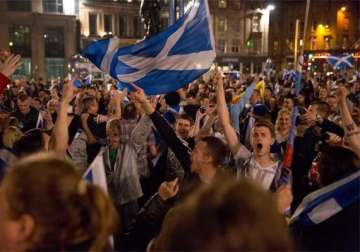Edinburgh (Scotland): Excitement vied with apprehension as Scottish voters went to the polls in a referendum on independence, deciding whether to dissolve a 307-year union with England that brought prosperity but has increasingly felt stifling to many Scots.
As the polls closed and the vote counting began, there was a quiet thrill of history in the making on the fog-shrouded streets of Scotland's capital, Edinburgh. Many Scots were staying up all night in homes and bars to watch the results roll in.
Eager voters had lined up outside some polling stations even before they opened at 7 am yesterday. Many polling stations were busy and turnout was expected to be high. More than 4.2 million people had registered to vote, 97 percent of those eligible, including residents as young as 16.
A Yes vote would trigger 18 months of negotiations between Scottish leaders and London-based politicians on how the two countries would separate their institutions before Scotland's planned Independence Day on March 24, 2016.
For some, it was a day they had dreamed of for decades.
For others, the time had finally come to make up their minds about the future, both for themselves and for the United Kingdom.
“Fifty years I fought for this,” said 83-year-old Isabelle Smith, a Yes supporter in Edinburgh's maritime district of Newhaven, a former fishing port. “And we are going to win. I can feel it in my bones.”
For Smith, who went to the polling station decked out in a blue-and-white pro-independence shirt and rosette, statehood for Scotland was a dream nurtured during three decades living in the US with her late husband.
“The one thing America has that the Scots don't have is confidence,” said Smith, who returned to Scotland years ago.
“But they're getting it, they're walking tall.” “No matter what, Scotland will never, ever be the same again.”
The question on the ballot paper could not be simpler:
“Should Scotland be an independent country?” Yet it has divided Scots during months of campaigning, generating an unprecedented volume and intensity of public debate and participation. The Yes side, in particular, has energised young people and previously disillusioned working-class voters.
Polls suggest the result was too close to call. A final Ipsos MORI poll released yesterday put support for the No side at 53 per cent and Yes at 47 per cent. The phone survey of 991 people has a margin of error of plus or minus three percentage points.
Until recently, polls suggested as many as 1 in 5 voters was undecided, but that number has shrunk dramatically. In the latest poll, only 4 per cent remained uncertain how they would vote.
Many questions, the currency independent Scotland would use, its status within the European Union and NATO, the fate of Britain's nuclear-armed submarines, based at a Scottish port, remain uncertain or disputed after months of campaigning.
Latest World News
